
About the CAS Climate Change Resource Library
This repository of recent climate change-related research and professional education features papers, presentations, and recordings from CAS publications and meetings, as well as interviews and press related to the topic.
Presentations and Recorded Sessions
SWAF Virtual Spring Meeting - June 10th, 2022
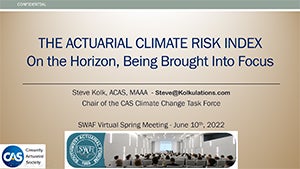
By Steve Kolk, ACAS, MAAA, Chair of the CAS Climate Change Task Force
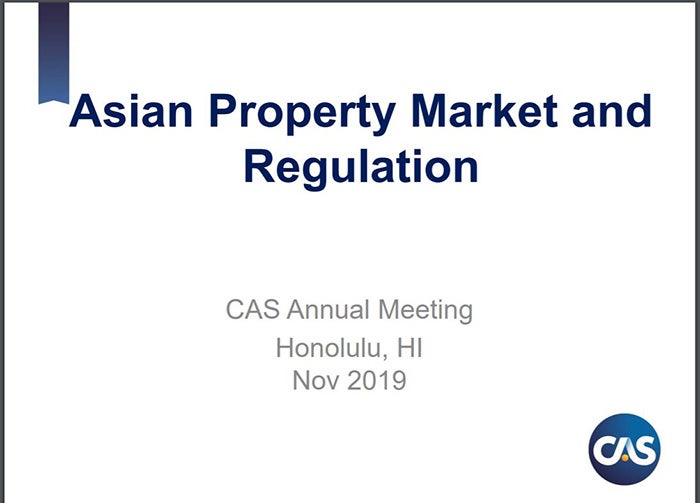
by Marcus Yamashiro, FCAS; Chor Leong Aw Yong, FCAS; Laurel Hu; Sang Cho, FCAS, CSPA
2019 CAS Annual Meeting (50 minutes)
An international panel (including Japan) spoke on Property Insurance and related capital regulations. Japan's property insurance regulations are unique. All property insurers are required to carry both an EQ reserve and a CAT reserve which can be described as a self-funded stop loss reinsurance, both funded and utilized per statutory rules, impacting capital requirements.
by Andy Neal
2019 CAS Annual Meeting (50 minutes)
While the federal government is lax in keeping NFIP funded, the insurance market is looking to provide more and more private flood insurance outside the NFIP. This session addressed the global threat of flood, and the potential for that threat to grow as the climate gets warmer and can support more moisture. RMS has developed a high-resolution flood model that captures all the physics of flooding and marries that with the vulnerability to flood inundation across a diverse range of buildings and occupancies. (Recording unavailable.)
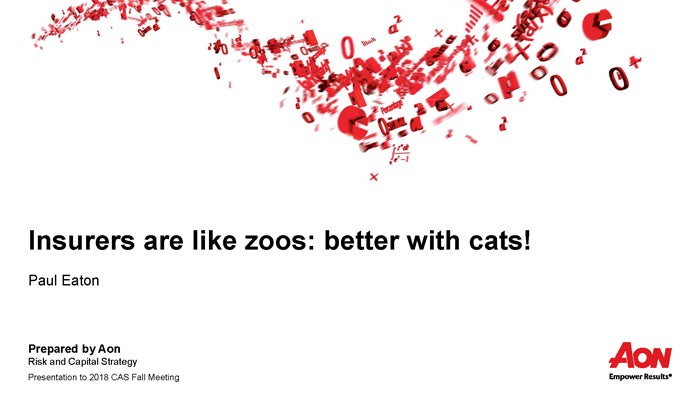
by Matthew Nielson
2019 CAS Annual Meeting (50 minutes)
This session analyzed how risk management professionals accounted for the impact of climate change on risk management, risk modeling, and other strategic planning activities, and examined the role of risk modeling in preparing governments and the insurance industry for the changes that lie ahead.
by David Ingram CERA, FSA, FRM, PRM; Max Rudolph, FSA; and Robert Wolf, FCAS
2019 CAS Spring Meeting (75 minutes)
Emerging risks are potential threats that can have a significant impact on a company. Are we looking far enough out in the future? Does our time horizon match our liabilities? These and more questions were discussed in an interactive dialogue that presented recent emerging risk surveys and blended in discussions on prudent approaches and best practices in emerging risk identification methodologies. (Recording unavailable.)
Climate Change - The New Normal
by Anna Ziolecki; James Lynch, FCAS, MAAA; and Peter Dailey
2019 CAS Spring Meeting (75 minutes)
A government report released in the fall of 2018 warned that extreme events are becoming more frequent, intense, and widespread. In fact, home insurance rates already increased more than 50 percent from 2005 to 2015, the year with the latest available data. The National Association of Insurance Commissioners attributes the increase to natural disasters, inflation, rising real estate values and construction costs.
Keeping Up with the Cat Models
by Eric Xu, FCAS, and Gregory Dietzen, FCAS
2019 Ratemaking, Product and Modeling (RPM) Seminar (75 minutes)
The impact of extreme weather has been felt throughout the world, and insurers, regulators, and legislators are increasing their attention to risk stemming from natural catastrophes. Specifically, recent destruction resulting from wildfires in the Western United States and flooding in coastal states has left these parties searching for answers.
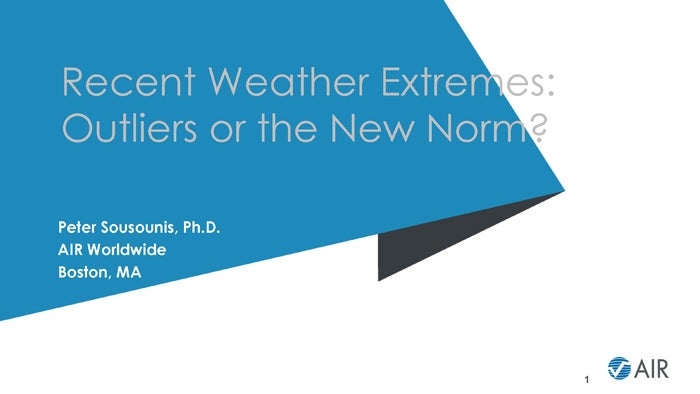
Recent Weather Extremes: Historical Outliers or The Norm of The Future?
by Peter Sousounis
2019 Casualty Loss Reserve Seminar (CLRS) (75 minutes)
This presentation covered four topics. 1) An overview of some of the recent weather disasters as they impacted the US and other parts of the world. 2) A summary on how and why weather extremes were expected to change in the future under continued climate change. 3) A brief explanation of a relatively new branch of climate change science known as extreme event attribution and the levels of confidence we have for different weather phenomena and why. 4) Commentary on whether the recent weather disasters were simply expected outliers or whether collectively they defined a new normal.
An Introduction to the Actuaries Climate Index® and the Actuaries Climate Risk Index
by Margaret Conroy, FCAS
2019 Casualty Loss Reserve Seminar (CLRS) (75 minutes)
During this session, the speakers discussed the Actuaries Climate Index® (ACI) and the Actuaries Climate Risk Index® (ACRI), both promulgated by the CAS, CIA, AAA, and SOA. The ACI is an educational tool designed to help inform actuaries, public policymakers, and the general public about climate trends and some of the potential impacts of a changing climate on the United States and Canada. The index is an objective measure of observed changes in extreme weather and sea levels. It is intended to provide a useful monitoring tool of climate
trends and is updated quarterly as data for each meteorological season becomes available. The ACRI relates the climate extremes to economic and human losses.
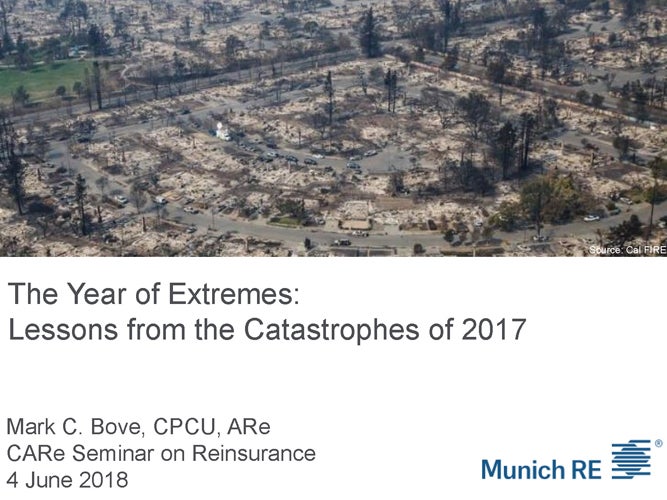
Geoscience Review
by Mark Bove
2018 Seminar on Reinsurance (75 minutes)
This session addressed the major natural catastrophe events of 2017. The events included Hurricanes Harvey and Irma, the California wildfires, and a specific emphasis on lessons learned and thoughts for the future from a Geoscience perspective. A comparison of the two storms will highlight the differences in the storm characteristics and the ultimate impact of building code enforcement, demographic shifts, and urban planning.
US Regulatory Landscape for P&C Actuaries: Don't Roll the Dice
by Gennady Stolyarov, ACAS; Julie Lederer, FCAS, MAAA; Kevin Dyke, FCAS; Lisa Chanzit, FCAS; and Mary Hosford, FCAS, CPCU, MAAA, AIM
2018 CAS Annual Meeting (75 minutes)
This session focused on the P&C actuarial "hot topics" that are top of mind for US state regulators.
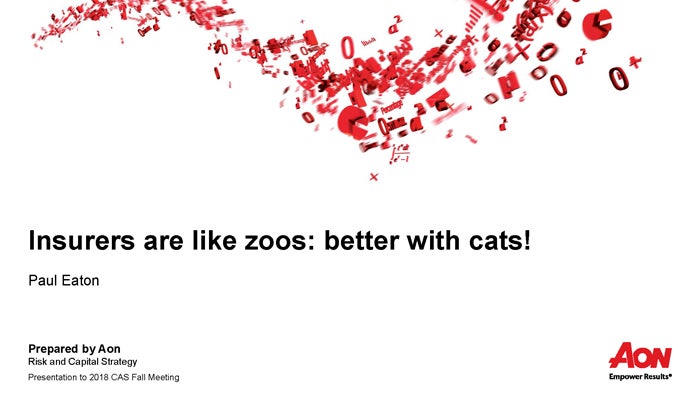
Climate Change and Catastrophes - Correlation or Causation?
Climate Change and Catastrophes - Correlation or Causation?
by Paul Eaton, FCAS and Peter Sousounis
2018 CAS Annual Meeting (75 minutes)
Hurricanes Maria, Irma, and Harvey were some of the costliest hurricanes in US history and they all occurred in the same year. Some meteorologists attributed the severity of these hurricanes to warmer waters as a result of global warming and climate scientists expect to see more of these types of storms in a warmer world. How are insurance companies responding to these changes in 2018 and 2019?
* Note: The full bundle of climate change recordings from 2019 events can be obtained from the CAS store for $75. Recordings from 2018 and earlier are available at no charge through UCAS.
Publications
Meteorology For Actuaries — Part 2: Climate And The El Niño Southern Oscillation
by Gwendolyn Anderson, ACAS, MAAA
2018 Casualty Actuarial Society E-Forum
Worldwide Tropical Cyclone Activity Measured Using The Actuaries Climate Index® Methodology
by Douglas Collins, FCAS, MAAA
2018 Casualty Actuarial Society E-Forum
Introduction—Climate Change: Impact on the Insurance Industry: Introduction
by Vijay Manghnani, FCAS, FSA
2014 Casualty Actuarial Society E-Forum
Dealing with Climate Change: Mainly Adaptation, with Little Mitigation, But That Is Not Enough
by Dan R. Anderson
2014 Casualty Actuarial Society E-Forum
Catastrophic Risk Management, Insurance, and the Hyogo Framework for Action 2005-2015
by Pei-Han Chen, and David L. Eckles
2014 Casualty Actuarial Society E-Forum
Managing Investment, Underwriting, and Production Risks from Drought-Related Agricultural Exposures
by Lisa A. Gardner, Ph.D. and Toby A. White, Ph.D.
2014 Casualty Actuarial Society E-Forum
Actuaries and Climate Change: Insights From Economic Theory
by Rick Gorvett, FCAS, ASA, CERA, MAAA, ARM, FRM, Ph.D.
2014 Casualty Actuarial Society E-Forum
Peshtigo Revisited
by Joseph J. Launie, Ph.D., CPCU, FACFE
2014 Casualty Actuarial Society E-Forum
The Earth is Warming: It Doesn't Matter Why
by Max J. Rudolph, FSA, CERA, CFA, MAAA
2014 Casualty Actuarial Society E-Forum
Sustainable/Green Insurance Products
by Rita Zona, Kevin Roll, and Zora Law
2014 Casualty Actuarial Society E-Forum
Where Home Insurance Meets Climate Change: Making Sense Of Climate Risk, Data Uncertainty, And Projections
by V. Lyubchich, K. Kilbourne Halimeda, and Yulia Gel
2019 Variance Casualty Actuarial Society

"New CCRMPs Discuss Worldwide Catastrophe Management and Climate Change"
by Joanne Spalla, FCAS, and Amy Brener
Actuarial Review, March/April 2020

“CAS Members Among the First Certified in Catastrophe Risk Management”
By Joanne Spalla, FCAS, and Amy Brener
Actuarial Review, January/February 2020

“Wildfires: Could They Be Manageable Catastrophes?”
by Lucian McMahon, CPCU
Actuarial Review, July/August 2019

“Risky Business: Five Emerging Risks Worth Watching”
by Annmarie Geddes Baribeau
Actuarial Review, March/April 2019
 "Actuaries Pioneer Work in Climate Change"
"Actuaries Pioneer Work in Climate Change"
by Brian Z. Brown, FCAS, MAAA
Actuarial Review, November/December 2018

“2017 – The Year of the CATs”
by Annmarie Geddes Baribeau
Actuarial Review, July/August 2018

"The SLR Factor: As sea levels rise, the flood risk equation changes"
by Annmarie Geddes Baribeau
Actuarial Review, March/April 2018
 "Studying Climate: The Next Steps"
"Studying Climate: The Next Steps"
by James P. Lynch, FCAS, MAAA
Actuarial Review, January/February 2018
The Actuaries Climate Index® (ACI) is an educational tool designed to help inform actuaries, public policymakers, and the general public about climate trends and some of the potential impacts of a changing climate on the United States and Canada. The index is an objective measure of observed changes in extreme weather and sea levels. It is intended to provide a useful monitoring tool of climate trends and will be updated quarterly as data for each meteorological season becomes available. The ACI is the result of a research project jointly funded by actuarial organizations of the United States and Canada.


